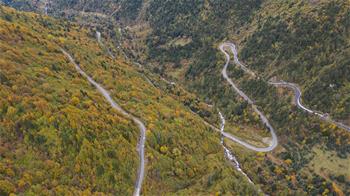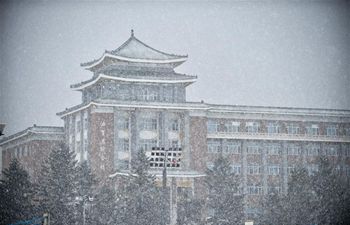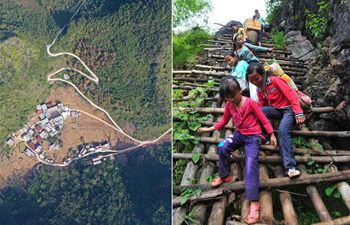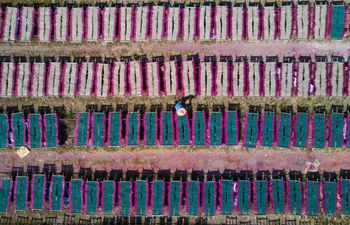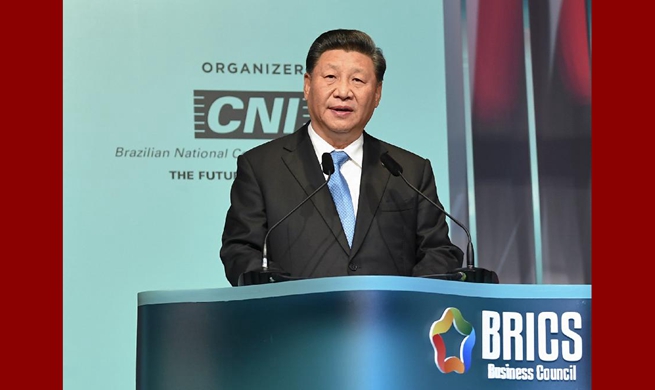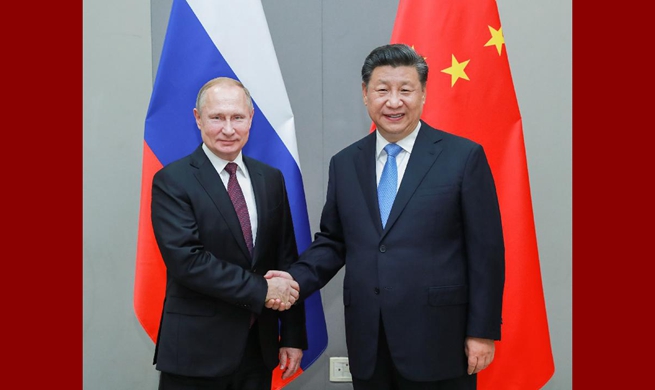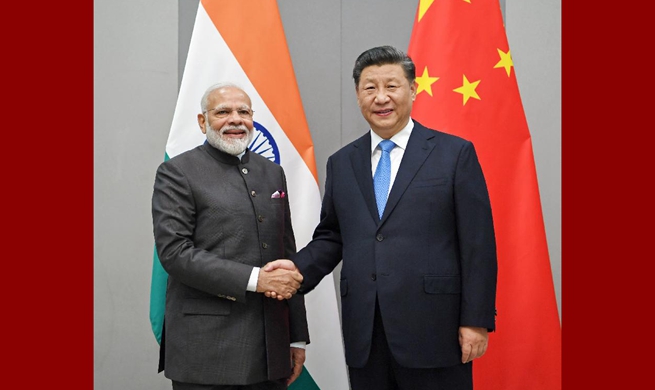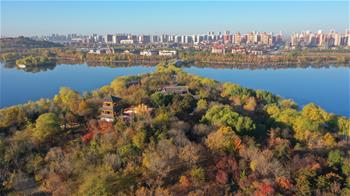by Xinhua writers Cheng Lu and Lyu Mengqi
TAIYUAN, Nov. 14 (Xinhua) -- Satchels and mugs emblazoned with late Chairman Mao Zedong's portrait, tree bark flour and farm tools... the nostalgic souvenirs stand in stark contrast to the modern villas, restaurants and museums of Dazhai, a small mountainous village in north China.
The former national "pace-setter village" of agriculture, which Chairman Mao called on all people in rural China to learn from in the 1960s, no longer relies solely on farming for its livelihood.
Last year came an opportunity for Dr. Jan Woudstra from the University of Sheffield to finally visit Dazhai, decades after he was first told about the village in Shanxi Province by an art teacher when he was at secondary school.
"I have always had a desire to see it and to know more about it," he said in an e-mailed interview with Xinhua. One of Woudstra's main research topics is the landscape development and architecture of the 20th century.
"Dazhai promised to be an interesting case study within a unique socio-political context, as an exploration of the relationship between man and nature," he said.
PACE-SETTER VILLAGE
The landscape with the terraces, village, water catchment system and paraphernalia in various museums allowed Woudstra to experience how popular Dazhai once was, not only with the Chinese, but also foreign visitors.
Locked in the Taihang Mountains, the drought-prone Dazhai, with a population of some 500, had little farmland, and local villagers lived in harsh conditions 70 years ago.
For 89-year-old villager Jia Chengyu, they were days of hunger. "We ate almost everything we could find to survive -- tree bark, leaves and bran," he said.
Getting enough to eat used to be a serious problem in China. The country's total grain output was around 113 million tonnes in 1949, or 209 kg a head per year.
Dazhai locals devised ingenious means to overcome nature by creating high-yield terraced farmland out of barren hillsides, a feat some people called miraculous.
Lacking large machinery, they carried rocks down the mountain with their shoulders, built rock dams and filled them with soil. Meanwhile, they set up two reservoirs for irrigation.
Dazhai's heyday came in the 1960s and 1970s after Chairman Mao called on rural people nationwide to learn from the village's feats in agriculture.
About 10 million visitors from home and abroad, including more than 25,000 foreigners from over 130 countries, have visited Dazhai which is known for its hard-working spirit and self-reliance.
NEW JOURNEY
Dazhai entered the fast lane of development in the 1990s owing to drastic changes brought about by the market economy.
It set up numerous businesses involved in the garment, food and beverage, spirits and tourism industries.
"Without developing agriculture, people cannot get enough to eat. If we did not develop industries, our villagers would not acquire wealth," said Guo Fenglian, 73, who was reputed as an "iron girl" for leading her fellows to fight poor natural conditions.
Woudstra has visited China four or five times and witnessed incredible changes on each return.
"I have been impressed by the ambitious plans and large-scale green systems that have been introduced everywhere," he said, adding that he is also concerned about the environmental pollution and there is a need to balance development and maintain an ecological balance.
At the end of 2012, Dazhai embraced a more environmentally friendly way of developement, closing all profitable but polluting factories in fields such as cement and coal mining.
Some of the landmark terraced fields, once a prototype for rural development, have been returned to forests to maintain harmony between man and nature.
The renowned Hutoushan (Tiger-head Mountain), where Dazhai people started terracing the barren hills decades ago, has become a forest park. Around 500,000 trees have been planted on the mountain's face.
The green development adds to the appeal of the village, now a tourist destination which attracted 300,000 people last year.
IMMORTAL LEGACY
Like many Dazhai residents with multiple careers, Zhao Huaxiao is a farmer, a museum guide and the owner of a rural family inn.
In 2013, he opened the first rural family inn in Dazhai. Equipped with six guestrooms, his villa receives around 1,000 visitors a year, bringing in up to 60,000 yuan (around 8,545 U.S. dollars) in profit.
"Dazhai set an example for Chinese people on how to fill their bellies at that time," 60-year-old Zhao said.
Over the past 20 years, Dazhai has invested more than 100 million yuan in building the village. People aged above 60 can receive a monthly pension between 200 yuan and 300 yuan. A nursing home will soon be opened as one out of every five residents are elderly.
Free education from kindergarten to middle school is offered here. Cash rewards for college students and medical insurance benefit all villagers.
Last year, the total economic output of Dazhai reached 460 million yuan, with a per capita net income of 23,000 yuan, around 6,000 yuan more than that in 2012.
"Dazhai is different from those regions famous for historical spots and stunning scenery. People come here to look back into history and see the Dazhai spirit featuring hard work, self-reliance and cooperative living, which has had an influence on generations of Chinese," Zhao said.
It seems that everything went off without a hitch. However, Dazhai is now confronting new challenges -- how to carry forward its spirit and attract young people.
"Most tourists to our village are aged above 50. They have gone through tough times and heard of Dazhai's history. But how to attract young people to the village has been a problem," said 46-year-old Zhang Shenli, who runs a souvenir shop in the village.
For Guo, the Dazhai spirit remains unchanged and is still needed in today's fast-changing world. "We should stay alert. Forgetting the past is a betrayal of the future," she said.




